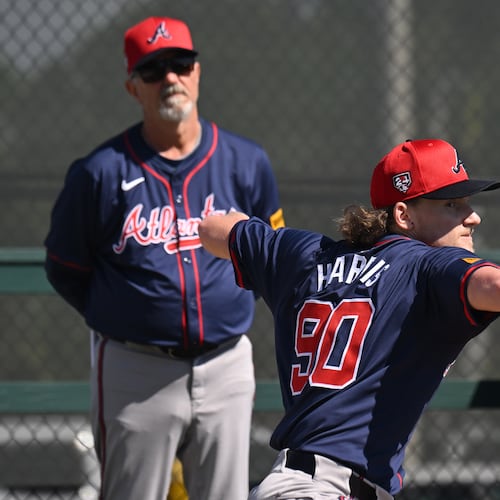OAKLAND, Calif. – Following Sunday night’s game – before a lengthy and late trip to Oakland – Braves manager Brian Snitker reflected on talking to Michael Soroka after the young pitcher tore his Achilles tendon for the second time in less than a year. Still, Snitker said, Soroka remained positive.
“And everything he went through the last couple of years, man, that would really test you,” Snitker said. “And every time I saw him, this guy was upbeat, he was driven to get back out there. I have a lot of respect for how he went about it.”
Snitker reminisced on the entire situation the night before handing the ball to Soroka again for the first time since Aug. 3, 2020 – a span of 1,029 days between MLB starts.
Soroka’s comeback is the feel-good story of all feel-good stories. It required more than many athletes would be able to handle.
Monday is a day of celebration for the Braves and their fans.
It also comes with this exciting realization: Soroka could be back for good. Finally, he has an opportunity to cement himself into Atlanta’s rotation once again.
How important is that?
Well, here what Snitker said, before Sunday’s game, about how good it would be to have five starting pitchers again: “Oh, it’d be great. I pointed to last year. It seemed like when we settled on (Spencer Strider in the rotation), that was one of the big things. It just allows you to get your bullpen stabilized. I think it was huge for us last year going forward. You have your five guys, you kept them on turn and it was really good. And then we’d pop somebody in, maybe in big stretches or whatever, if we wanted to give somebody an extra day.”
Soroka represents the chance for stability. Yes, it’s too early to know if he’ll ever come close to his pre-injury self. But the Braves have searched for rotation consistency ever since losing Max Fried and Kyle Wright, and this might be their best chance for it.
In the first turn through the rotation this season, the Braves went with Jared Shuster and Dylan Dodd, who both made their MLB debuts. Dodd fared better than Shuster. Both made two starts before the Braves optioned them.
Meanwhile, Bryce Elder took control of his rotation spot. He hasn’t let it go. Think about where the Braves would be without Elder’s 2.01 ERA, which ranks third in baseball among qualified starting pitchers.
Recently, Shuster and Dodd both received another opportunity. Shuster has made good on his, giving Atlanta three solid starts since the club recalled him again. Dodd hasn’t looked as good in two spot starts.
And now, the Braves are calling on Soroka – whom they officially recalled on Monday – to show them what he’s got. He’s been through so much, but he’s still only 25 years old.
“You forget that,” Snitker said. “He’s still just a kid, with a long, bright future ahead of him.”
Soroka brings hope – the hope of his upside, the hope of a stable rotation, the hope of no more bullpen games. The losses of Ian Anderson (Tommy John surgery) and Kolby Allard (60-day injured list for a Grade 2 oblique strain) mean the Braves’ depth is thinner than in spring training. This makes the depth pieces they do have that much more important.
The Braves have also gone 0-3 in bullpen games. Their bullpen hasn’t pitched well. Having five starters could allow Snitker to slot the relievers in more normal roles. The Braves were having to dance around their off days and their bullpen usage to trudge forward with four starters.
They won’t have to do that now.
Beginning Monday, Soroka has the opportunity to make the transition from depth option to rotation piece.
In Triple A, he had a 4.33 ERA over 35-1/3 innings. The Braves waited to give him the ball until he proved he deserved it.
Their underperforming bullpen and fluid rotation perhaps created more urgency, but Soroka pitched better over his last two starts. Last Tuesday, he allowed a run on two hits over six innings, with eight strikeouts and three walks. Before that, he surrendered only a run on two hits over 4-2/3 frames.
One big number: 96, the number of pitches he threw in his last start. This gave the Braves more confidence he could handle the workload of a big-league game.
“With a pitcher, results are something,” Snitker said. “With a hitter, when they go down there, you don’t look at results that much. You look at health, you look at different things. With a pitcher, though, you want to see them throw the ball over, you want to see the secondary stuff, you want to get them stretched out.
“He’s checked the boxes off.”
And now, Soroka is officially back.
About the Author
Keep Reading
The Latest
Featured



